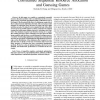Free Online Productivity Tools
i2Speak
i2Symbol
i2OCR
iTex2Img
iWeb2Print
iWeb2Shot
i2Type
iPdf2Split
iPdf2Merge
i2Bopomofo
i2Arabic
i2Style
i2Image
i2PDF
iLatex2Rtf
Sci2ools
107
Voted
TIT
2008
2008
Constrained Sequential Resource Allocation and Guessing Games
In this paper, we consider a constrained sequential resource allocation problem where an individual needs to accomplish a task by repeatedly guessing/investing a sufficient level of effort/input. If the investment falls short of a minimum required level that is unknown to the individual, she fails; with each unsuccessful attempt, the individual then increases the input and tries again until she succeeds. The objective is to complete the task with as little resources/cost as possible subject to a delay constraint. The optimal strategy lies in the proper balance between 1) selecting a level (far) below the minimum required and therefore having to try again, thus wasting resources, and 2) selecting a level (far) above the minimum required, and therefore, overshooting and wasting resources. A number of motivating applications arising from communication networks are provided. Assuming that the individual has no knowledge on the distribution of the minimum effort required to complete the tas...
| Added | 15 Dec 2010 |
| Updated | 15 Dec 2010 |
| Type | Journal |
| Year | 2008 |
| Where | TIT |
| Authors | Nicholas B. Chang, Mingyan Liu |
Comments (0)

